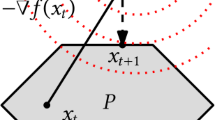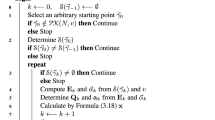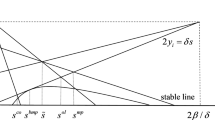Abstract
The theory of differential games is extended to the situation where there areN players and where the game is nonzero-sum, i.e., the players wish to minimize different performance criteria. Dropping the usual zero-sum condition adds several interesting new features. It is no longer obvious what should be demanded of asolution, and three types of solutions are discussed:Nash equilibrium, minimax, andnoninferior set of strategies. For one special case, the linear-quadratic game, all three of these solutions can be obtained by solving sets of ordinary matrix differential equations. To illustrate the differences between zero-sum and nonzero-sum games, the results are applied to a nonzero-sum version of a simple pursuit-evasion problem first considered by Ho, Bryson, and Baron (Ref. 1).Negotiated solutions are found to exist which give better results forboth players than the usualsaddle-point solution. To illustrate that the theory may find interesting applications in economic analysis, a problem is outlined involving the dividend policies of firms operating in an imperfectly competitive market.
Similar content being viewed by others
References
Ho, Y. C., Bryson, A. E., andBaron, S.,Differential Games and Optimal Pursuit-Evasion Strategies, IEEE Transactions on Automatic Control, Vol. AC-10, No. 4, 1965.
Isaacs, R.,Differential Games, John Wiley and Sons, New York, 1965.
Case, J. H.,Equilibrium Points of N-Person Differential Games, University of Michigan, Department of Industrial Engineering, TR No. 1967-1, 1967.
Luce, R. D., andRaiffa, H.,Games and Decisions, John Wiley and Sons, New York, 1957.
Dacunha, N. O., andPolak, E.,Constrained Minimization Under Vector-Valued Criteria in Finite-Dimensional Spaces, University of California at Berkeley, Electronics Research Laboratory, Memorandum No. ERL-M188, 1966.
Zadeh, L. A.,Optimality and Non-Scalar-Valued Performance Criteria, IEEE Transactions on Automatic Control, Vol. AC-8, No. 1, 1963.
Klinger, A.,Vector-Valued Performance Criteria, IEEE Transactions on Automatic Control, Vol. AC-9, No. 1, 1964.
Author information
Authors and Affiliations
Additional information
This research was supported by Joint Services Electronics Contracts Nos. N00014-67-A-0298-0006, 0005, 0008 and by NASA Grant No. NGR 22-007-068.
Rights and permissions
About this article
Cite this article
Starr, A.W., Ho, Y.C. Nonzero-sum differential games. J Optim Theory Appl 3, 184–206 (1969). https://doi.org/10.1007/BF00929443
Received:
Issue Date:
DOI: https://doi.org/10.1007/BF00929443




